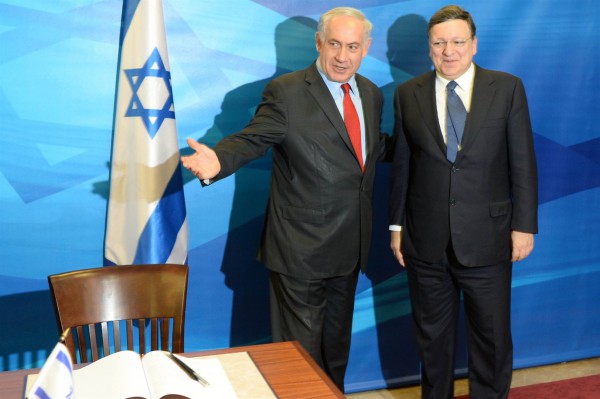“I will also make you a light for the Gentiles, that my salvation may reach to the ends of the earth.” (Isaiah 49:6)
On Sunday Israel and the European Union signed the Horizon 2020 agreement that gives Israel access to the EU’s largest ever research and development program.
European Commission President Jose Manuel Barroso met with Israeli Prime Minister Benjamin Netanyahu and Minister of Science, Technology and Space Yaakov Perry to sign the agreement.
At the time of the signing, President Barroso said, “Israel is a strong player in research and innovation and for this reason an important partner for the EU to address societal challenges of common concern, such as aging, food safety, environment protection or cleaner energy, and to strengthen the competitiveness of our industries. I am pleased that we are signing the agreement today since it reflects the mutual importance we attach to cooperation and partnership in research and innovation.”

Prime Minister Benjamin Netanyahu and European Commission President Jose Manuel Barroso attend the signing ceremony on Israel’s accession to Horizon 2020, the EU Framework Programme for Research and Innovation, which is among the largest programs in the world for scientific and industrial cooperation.
Commenting on what Israel is bringing to the table, Minister Perry said, “This is proof of the power of Israeli science and its importance to the future of the State of Israel.”
He added, “Our joining the program is significant news for Israeli science and will bring stronger scientific connections with Europe and to hundreds of generous research grants for researchers in Israel.”
The agreement allows Israel to participate and benefit the same as any other member state. (HaAretz)
The total fund, valued at 80 billion euros ($113 billion), is available over a seven-year period in the form of grants for scientific research and technological innovation. Of that amount, Israel will contribute 140 million euros ($191 million) per year with an expected relative return from the fund of 60%. (Times of Israel)
Israel, the first and only non-member state to have access to the fund, devotes 4% of its GDP to research and development in the fields of science, medicine, technology and the environment. It has been working with the EU since 1996, but the present agreement will allow for a more active involvement. (nocamels)
Last year, the agreement was placed in jeopardy by the new EU guidelines that denied any form of financial support to institutions based beyond what is called the “green line,” the cease fire lines of 1949.
This would have excluded funding of any institutions in Judea and Samaria or East Jerusalem.
Netanyahu and other government leaders were concerned that signing any agreement under those terms would have been an admission that these territories are not a part of the Jewish state.
Then last November, Justice Minister Tzipi Livni forged an agreement that made it possible for both sides to maintain their positions but still work together. In the final agreement, Israel added a statement that it does not accept the EU’s definition of whom the territory beyond the 1967 lines legally belongs to. Yet, funding will still be denied to institutions operating in these disputed territories. (Times of Israel)





